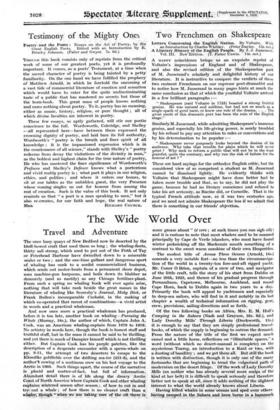Two Frenchmen on Shakespeare
Letters Concerning the English Nation. By Voltaire. With an Introduction by Charles Whibley. (Peter Davies. 16s. net.) A Literary History of the English People. By J. J. Jusserand. Vol. III. New 'Edition. (T. Fisher Unwin. 15s. net.) A HAPPY coincidence brings us an exquisite reprint of Voltaire's impressions of England and of Shakespeare, and also the revised edition of the Shakespearian part of M. Jusserand's scholarly and delightful history of our literature. It is instructive to compare the verdicts of these two eminent Frenchmen on our supreme poet-dramatist and to notice how M. Jusserand in many pages hints at much the same conclusion as that at which the youthful Voltaire arrived in a few brilliant paragraphs :— " Shakespeare (said Voltaire in 1733) boasted a strong fruitful genius. He was natural and sublime, but had not so much as a single spark of good taste, or knew one rule of the drama. . • . The great merit of this dramatic poet has been the ruin of the English stage."
SimilarlyM.Jusserand, while admitting Shakespeare's immense genius, and especially his life-giving power, is sorely troubled by his refusal to pay any attention to rules or conventions and by his determination to be popular :— " Shakespeare never purposely looks beyond the desires of his audience. Why take that trouble for plays which he will never print ? Why seek to reform a public that will not be in the least grateful, quite the contrary, and why run the risk of failure for the honour of art ? "
These are hard sayings for the orthodox English critic, but the considered view of so competent a student as M. Jusserand cannot be dismissed' lightly. He evidently thinks with Voltaire that Shakespeare might have done better had he taken more trouble and that, so to say, he did not play the game, because he had no literary conscience and refused to take his art seriously, as Racine did, or Corneille. That is the typical French attitude now, as it was two centuries ago, and we need not admire Shakespeare the less if we admit that there is something in our friends' objection.






























































 Previous page
Previous page